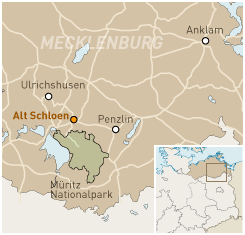Land confiscation
After the Second World War, socialistic states imposed a collectivisation and industrialisation of agriculture. As a consequence
of the decisions made in the Second Party Conference, a land reform was executed in the Soviet occupation zone in 1952. This
was followed by the union of the farmers into the agricultural cooperative society (LPG). The ownership of the land that the
farmers brought into the LPG remained with them, but a comprehensive right of use was handed off to the LPG. Apart from the
contribution of their own goods for the communities sake, the farmers obliged to also dedicate all of their workforce to the
LPG and to respect its regulations.
Even though the union was voluntary, a considerably amount of pressure had been exercised by the government on the farmers as to join the LPG. Still, the foundation of large-scale productions also introduced a facilitation of working conditions which was supposed to secure the farmers´ future. Due to the membership of the LPG the farmers had fixed working hours, an annual bonus, a fixed salary, shared profits and an above-average income. Irrespective of their social background, all members were equal.
After the German reunification, the LPG was dissolved and the rights of property have been re-assigned to those who owned the land before the land reform had been imposed - a source of numerous lawsuits.
Even though the union was voluntary, a considerably amount of pressure had been exercised by the government on the farmers as to join the LPG. Still, the foundation of large-scale productions also introduced a facilitation of working conditions which was supposed to secure the farmers´ future. Due to the membership of the LPG the farmers had fixed working hours, an annual bonus, a fixed salary, shared profits and an above-average income. Irrespective of their social background, all members were equal.
After the German reunification, the LPG was dissolved and the rights of property have been re-assigned to those who owned the land before the land reform had been imposed - a source of numerous lawsuits.
Old Schloen
A point where rivers meet Land confiscation Organic farming - Alternative agriculture Raise Bio: Organic farming
